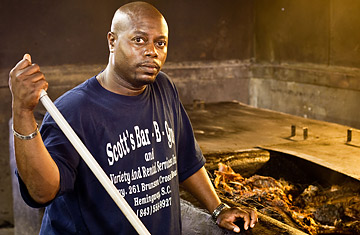
Rodney Scott, proprietor of Scott's Barbeque
Everyone loves Rodney Scott. Heroically obscure until last year, he is suddenly the idol of the food-writing world. Scott, who runs a tiny barbecue pit in the remote hamlet of Hemingway, S.C., was the subject of Joe York's 2010 short film Cut/Chop/Cook, one of the greatest films ever made about barbecue in America, in my opinion. Then, in Saveur's June/July BBQ issue, a full-page image of the man appeared alongside the lead article, John T. Edge's "BBQ Nation." (The love didn't end there, either; half a dozen big images of Scott's employees appear elsewhere in the magazine.) There's no question that you'll be seeing more of Scott, who is poised to join the country's other BBQ immortals, like Memphis in May champ Chris Lilly, Texas beef legend Rick Schmidt and Myron Mixon of TLC's BBQ Pitmasters fame. But why should the average person care? And why should a simple barbecuer matter so much?
Food writers as a group are inordinately fond of barbecuers. They have approximately the same feelings for them that hentai fans have for Japanese schoolgirls. Their natural tendency is to lionize them (and it helps that some of them, like Mixon, actually look like lions.) The reasons are pretty obvious. BBQ is the most distinctly American of all our cuisines, and the hardest to master. A true specialist's art, it requires years of patience and experience, and access to equipment that most people have never even seen, much less toted around thousands of miles for catering jobs. Then, too, there is the fact that BBQers are generally rural types, whom nerdy urban writers openly idolize for their authenticity, and for the fact that none of their virtues are at all threatening. And of course, great barbecue is really, really good, and once you have had it, you are naturally filled with a kind of vague and reverent awe for the man who made it. (And I'm not being sexist here — for whatever reason, pitmasters are almost always men.)
Rodney Scott so personifies everything people admire about barbecue that he almost seems like some food writer dreamed him up. He cooked his first whole hog at the age of 11. He cuts all the wood for Scott's Bar-B-Que himself, with a chain saw. He cooks only one thing, whole hogs, and he cooks them superlatively well. His pits consist of two long concrete bunkers, which he heats by shovelling hot ashes that he burns in a big steel cylinder that has truck axles welded into it as cross beams. Logs go on the top, and as they cook down into smaller embers, they pass progressively down to the tube and eventually make their way into the pits, where they cook splayed hogs that have been suspended from chicken wire above the heat. Scott mops the pigs with an actual mop, its long, thick strings dripping with peppery vinegar. He knows what he is doing. His meat is more sapid, and his skin more deliciously crispy, than any whole hog I've ever eaten. And, of course, you sit in his tiny country store with a loaf of white bread and big bottles of strawberry soda to eat it. This is food heaven to a jaded, effete food writer like me. And Scott really is a hero. He works harder, and with more skill and more dedication, for less money and fame, than any cook in America.
Now, the fame has begun to arrive. Money will, I hope, follow. And what then?

Pulled pork, fried pork skins, BBQ pork
skins and sauce, at Scott's Barbeque
Peter Frank Edwards / The New York Times / Redux
The problem with the way we writers think of barbecuers is that we secretly want them to be poor and obscure. I know this sounds mean, and it is, but it's not that different from the open wish of every indie music fan, who wants their favorite band to have two EPs and no songs on iTunes. Once a barbecuer is discovered, and starts appearing on TV, he no longer belongs to the American Eden; he's no longer a rude child of nature, a savant of the smoky arts. With the demands of a commercial restaurant and other aspects that come with culinary fame, his BBQ becomes hopelessly compromised, requiring him to make too much at a time, to mix gas heat in with his wood heat (if he has any), to keep the meat in Alto-Sham warming boxes for hours, and other shortcuts.
I will go down here as saying that I want Rodney Scott to get rich and famous. I want him to open a chain of cheesy franchise restaurants; I want him to have his own reality show; I want him to outgrow his unforgettable, magical, one-of-a-kind BBQ joint and to stop cutting trees himself. I admire him so much I even invited him to cook at the annual meat festival I put on this past weekend in New York City. He's a young man, not even 40, which means he has decades to go as he gets better and older and fatter. Maybe he'll even grow a gray beard like Ed Mitchell, the Grand Old Man of Carolina whole-hog barbecue. But I wouldn't want to toil away in a barbecue pit for 30 more years, and so I can't in good conscience want Rodney too either. But while he is, and even afterward, I will honor him. You should too.
Josh Ozersky is a James Beard Award–winning food writer and the author of The Hamburger: A History. He is currently at work on a biography of Colonel Sanders. Taste of America, Ozersky's food column for TIME.com, appears every Wednesday.
